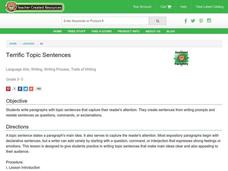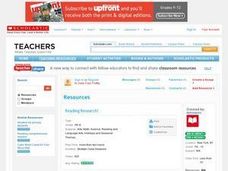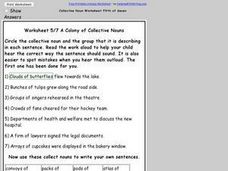University of the Desert
What Is Extremism?
By participating in discussions using prompts and statements provided in the lesson plan, learners identify the concept of extremism and consider what causes violent acts of extremism in the modern world.
Curated OER
Orca Search
Students conduct a variety of research activities to widen their knowledge about Orca Whales. They compile their research into a paper.
Curated OER
How Big is a Blue?
Students determine the length of different whales using a rope marked off and color coded to each length. They create life-size scale drawings of whales on butcher paper.
Curated OER
The Greatest Threats
Students work together in groups to research one way killer whales are being threatened. They brainstorm ways to some the threat and actions that can be taken to keep them protected. In new groups, they share their proposed actions...
Curated OER
Orca Search: Step 5 Research Report
Pupils report their Orca research to the rest of the class choosing from a variety of formats. They touch on basic orca statistics, whales in captivity and their own opinions on this issue.
Curated OER
"Be the Kiwi" - Maori Oral Tradition and Performance
Students create a story similar to those of the Maori oral tradition. In this Whale Rider instructional activity, students discuss the way that Maori legends were passed down from generation to generation. Students choose a land...
Curated OER
Moby-Dick
Pupils take on the persona of a sailor or a captain of a whaling vessel in New England in the 1800s and write five journal entries as that person. In this Moby Dick instructional activity, students research the whaling industry in 19th...
Curated OER
Whale Echolocation
Students demonstrate how a whale uses echolocation to track food and identify one other animal that also uses echolocation. In this echolocation lesson, students play a game where one child (the whale) is blindfolded and gives a signal...
Curated OER
Why Don't Whales Have Legs?
Students are given a variety of materials and are asked to design a heat loss experiment that results in a reasonable explanation of "Why don't whales have legs?" students work with the theory of natural selection.
Curated OER
Why the Whales Came- The Beach
In this why the whales came worksheet, students add adjectives and adverbs to a paragraph about nature. Students fill in twelve adjectives or adverbs from given words and then write sentences of their own.
Curated OER
Observing and Discovering Using Our Senses
Third graders decide if it is possible to identify something using only the senses of taste, smell and hearing. They listen to a CD of animal sounds with their eyes closed and attempt to identify the animal. Next, they smell an air...
Curated OER
Using Commas to Write Lists
In this commas in lists learning exercise, students examine 3 labeled pictures and the name of someone who bought the items. Students write a sentence with commas in a list. Students then insert commas in 10 sentences with lists. There...
Curated OER
Letter w is for Whale
In this printing letter w worksheet, 1st graders study the example lowercase letter w and then use the 4 provided lines to practice printing the letter.
National Endowment for the Humanities
Literary Genres in “Moby-Dick”
Moby Dick is more than a whale of a tale narrated by Ishmael. A lesson studying Herman Melville's classic novel asks readers to examine the different genres the author weaves into his story. Instructors model how to conduct a stylistic...
Curated OER
Terrific Topic Sentences
Capture the interest of your reader with terrific topic sentences. To practice hooking the reader, your class will be given writing prompts, and they must create topic sentences for each prompt provided. Encourage them to use different...
Curated OER
Aquatic Safari
Learners use an Internet Web site to locate the scientific information about various marine species. They use the Internet to find the scientific information about marine animals.
Curated OER
A Proportional Fish Story
In this proportions instructional activity, students identify and complete 8 different problems that include using proportions to build scale models of various animals. First, they use the scale to complete the chart and draw lines...
Curated OER
Animals in the Media
Sure to activate young minds, this resource asks learners to consider how media influences their personal points of view. Pupils examine how animals are portrayed in the media to understand why they feel the way they do about those...
Curated OER
Homophones!
Explore homophones. Second graders can use this presentation to review common homophones, such as son and sun, and wail and whale. This resource could be augmented with a greater variety of examples to make this a richer experience.
Curated OER
Reading Research!
Students investigate the life of an animal and how it responds to winter. The lesson's focus is on reading and research skills using pictures to assist in the understanding of the information presented.
Curated OER
Worksheet 5/7 A Colony of Collective Nouns
Practice identifying and using collective nouns with this resource. For this activity, pupils circle the collective noun and the group that it describes in each sentence. They then use the collective nouns to write their own sentences....
Curated OER
Vocab-u-lous! Build a Fabulous Vocab
In this vocabulary building worksheet, learners enhance their personal vocabulary by learning words that begin with FL-blends. Students are allowed the use of dictionaries.
Curated OER
Worksheet 3/7 A Gaggle of Collective Nouns
Encourage your class to identify the correct usage of collective nouns in sentences with this activity. Given three choices, with the collective nouns circled in each possible choice, class members choose the sentence in which the...
Curated OER
Investigating and Using Biomass Gases
Learners examine the definitions of biomas gasification and generate their own biomass gas. In this renewable energy lesson students collect gases and roast a marshmallow.

























